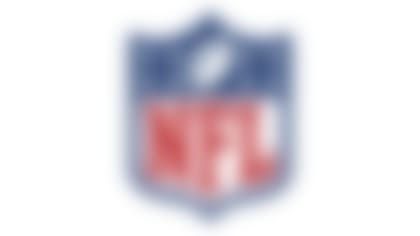NFL Commissioner Roger Goodell and two prominent owners quietly traveled to Florida this week for the first formal bargaining session in more than a month with the players' union -- a meeting in which both sides modified their positions on the central economic issue, though there was still no major breakthrough amidst hopes of completing a new collective bargaining agreement during the league's 100th season.
According to people familiar with the meeting, New York Giants President and CEO John Mara and Kansas City Chiefs Chairman and CEO Clark Hunt joined Goodell for the meeting Tuesday in Jacksonville with NFL Players Association Executive Director DeMaurice Smith -- who was in town to meet with Jaguars players -- and union president Eric Winston.
While there had been multiple staff meetings in recent weeks, this was the first time the principals had been in a room together since late August, when the sides agreed to table bargaining as Smith began his annual tour of all 32 teams.
There is no firm timeline or deadline for agreeing to a new CBA, though there are some key benchmarks ahead. That includes a March election for the NFLPA executive committee, with Winston -- the 12-year veteran tackle who is now retired and will be ineligible to run for a fourth term, barring a surprise comeback -- among those due to cycle off under the union's constitution because he's not playing this season.
"You don't have timelines in CBA negotiations," Goodell told NFL Network's Stacey Dales on Sunday morning in London ahead of the Bears-Raiders game. "We've had a lot of discussions over several months. They continue.
"We'll see, we'll keep working on it."
Owners have remained committed throughout the process to growing the pot by adding regular season games -- focused exclusively in recent weeks on a 17-game schedule, rather than 18 -- without making significant economic concessions, while players want to grow their share of revenue without adding regular-season games. Players are guaranteed at least 47 percent of total revenue under the existing CBA, which is set to expire after the 2020 season.
Sources say one important issue within a complicated economic discussion is how to divide revenue from the new SoFi Stadium in Inglewood, California, which will be home to the Rams and the Chargers. The roughly $5 billion price tag for the L.A. stadium project is much higher than others; by owners' calculations, it also will bring in much more revenue than other stadiums and they want the new CBA to reflect that investment, while players have pushed back at the idea of altering the revenue-sharing calculation based on one project they had no role in approving.
While both sides have expressed openness to expanding the playoff field from 12 to 14 teams, in part as a means to recover revenue lost by the likely shortening of the preseason, it has not been a major topic recently, the people said.
Since bargaining began months ago, people on both sides have described the tone of talks as more positive than the acrimonious 2011 negotiation, which included a 132-day lockout. As a show of good faith, Smith's tour was accelerated from past years and is scheduled to end this week.
Meanwhile, the NFL's fall meetings are scheduled for Oct. 15-16 in Fort Lauderdale, Florida. It's expected that bargaining will pick up again soon thereafter, though no additional sessions have been scheduled at this time.
As was reported last week, the league would ideally approach networks by December about extending the league's TV deals. So, a promise of labor peace for years to come at that point would be valuable and creates a logical target for trying to strike a deal.
Until the macroeconomic issues are resolved, agreements on other issues remain tentative. Among the recent discussion points has been a push on the player side for changes to the fifth-year option on rookie contracts that would make it less restrictive (one idea: count the fifth year as a franchise tag, with a special exception created for rookies).
Sources say there also are tentative agreements on issues involving benefits, raising minimum salaries, improving former player health care, workplace rules, how grievances are handled, health and safety, etc. One non-economic issue that owners and player leadership have discussed in bargaining sessions is marijuana, with both sides on board with making the negotiated policy less punitive, sources say.
Follow Tom Pelissero on Twitter @TomPelissero.












